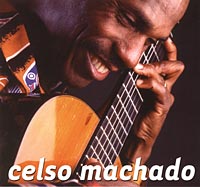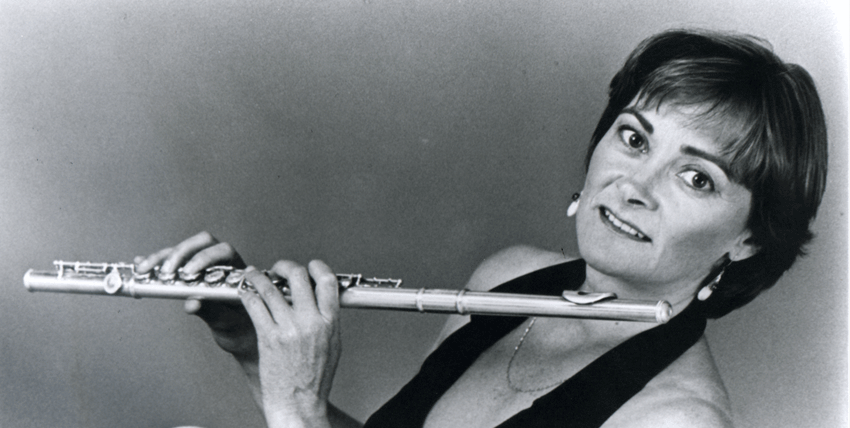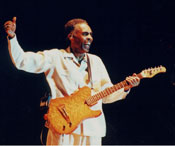
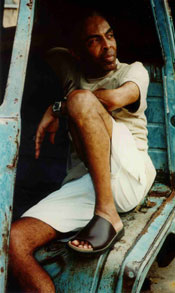
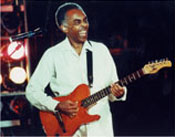
|
"Multi-instrumentalist, singer/songwriter
Gilberto Gil joined his first group, the Desafinados, in the mid-'50s and by the
beginning of the 1960s was earning a living as a jingle composer. Although known mostly as a
guitarist, he also holds his own with drums, trumpet, and accordion. He
began playing the accordion when he was eight, and he listened to street
singers in the marketplace around Salvador. By the end of the 1950s, Gil
was studying business administration at Savlador's Federal University and
playing with a group called Os Desafinados. At this time he heard singer
and guitarist Jočo Gilberto on the radio and was so impressed that he
immediately bought a guitar and learned to play and sing the bossa nova.
He spent the early '60s composing songs for TV ads, and in 1964, he was in
Nos Por Exemplo, a show of bossa nova and traditional Brazilian songs
directed by Caetano Veloso. In 1965, he moved to Sčo Paulo, and after
singing and playing in various shows, he had his first hit when singer Elis
Regina recorded his song "Louvacao." He began to establish himself as a
singer of protest songs, and he became very popular with Brazilians
involved in the Tropicalia movement, which opened up native Brazilian folk
music to other kinds of influences. The success of the single "Louvacao"
inspired Gil to record an album of his own material with the same title.
Gil made his first self-titled recording in 1966, but his first hit single
didn't come about until 1969, with "Aquele Abraco." His musical fusion of
bossa nova, samba, and other styles was so revolutionary it frightened the
country's military dictatorship into arresting him, and that's when he
headed to Great Britain. (He and Caetano Veloso were placed in solitary
confinement while authorities figured out what they wanted to do with the
pair.) After three years in England, where he had the chance to work with
groups like Pink Floyd, Yes, the Incredible String Band, and Rod Stewart's
band in London clubs, he returned to Brazil in 1972. He recorded Expresso
2222, which spurred two hit singles in Brazil, "Back in Bahia" and
"Oriente." After playing at the Midem Festival in France in 1973, Gil
recorded Ao Vivo in 1974. A year later, he recorded with Jorge Ben for the
album Gil & Jorge. In 1976, he toured with Veloso, Gal Costa, and Maria
BethČnia and released the Doces Báraros album. For most of the rest of the
1970s, he recorded for a variety of Brazilian record companies until
signing an international deal with the WEA group of labels in 1977. He
toured U.S. colleges in 1978 and firmly established his place in the
international jazz world with his albums Nightingale (1978) and Realce
(1979). He also released a double live album in 1978, Gilberto Gil ao Vivo
em Montreux, recorded during his performances at the jazz and blues
festival in Switzerland. In 1980, Gil teamed up with reggae musician Jimmy
Cliff. The pair toured Brazil, and Gil's cover of Bob Marley's "No Woman,
No Cry" climbed to number one, selling 700,000 copies. Gil followed up in
1981 with Luar (A Gente Precisa Ver o Luar), one of his most acclaimed
recordings. In 1982, he performed again at the Montreux Festival, but this
time with Jimmy Cliff. He followed up with Um Banda Um (1982), Extra
(1983), and Raća Humana (1984), the last recorded with Bob Marley's
Wailers. In the late '70s, Gil became a prominent spokesman for the black
consciousness movement then taking place in Brazil. In 1982, he had huge
crossover success with "Palco,"which became popular in dance clubs and led
to stadium tours of Europe. Meanwhile, back in the U.S., he would play
mid-sized jazz clubs in New York City and Los Angeles. Gil celebrated his
then two-decade career in 1985 with the album DIA Dorim Noite Neon
(released in the U.S.), and released Gilberto Gil em Concerto, recorded
live in Rio, in 1987. The early '90s saw Gil continuing his involvement in
social and political causes in his native country, finding widespread
support for his political stances, and he was elected to office in the port
city of Salvador, his hometown, aka the Black Rome. A leader of the
Tropicalia movement in Brazil in 1967 and 1968 along with artists like
Caetano
Veloso and Gal Costa, he and other musicians mixed native styles
with rock and folk instruments. Because Gil fused samba, salsa, and bossa
nova with rock and folk music, he's recognized today as one of the pioneers
in world music. Among Gil's other albums are Refazenda (1975), Gilberto a
Bahia (1985), and Parabolic (1992). He released Acoustic for the Atlantic
Jazz label in 1994. On Acoustic, he's joined by Carlos Fonseca on acoustic
guitar and Jorges Gomes on drums and mandolin." ~ Richard Skelly, All Music
Guide |
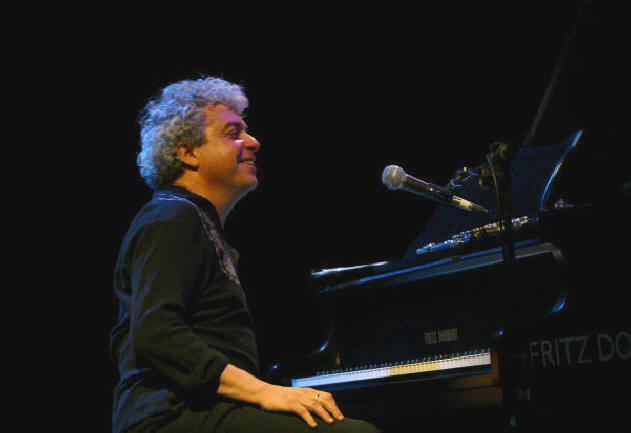 |
Jovino Santos Neto creates a musical
feast. After 15 years as musical director,
performer, composer and producer for the Hermeto Pascoal Group, he joined,
and recorded "Encounters of the Fourth World", with Airto Moreira and Flora
Purim. He now composes and arranges for his own Quinteto in the
Pacific Northwest and released ""Caboclo"
and "Ao Vivo Em Olympia"
Jovino is a brilliant, intuitive and impassioned pianist and flutist, who
merges his passion for his Brazilian roots with jazz and classical expressions.
In 2001 he collaborated with guitarist, Richard Boukas on a driving and
brilliant CD,"Balaio"
,featuring compositions by and dedicated to Hermeto Pascoal
"...beautifully recorded samba fusion. His works are fused with the intense
and energetic rhythms of Brazil." "Jovino Santos Neto, always a busy musician, surpassed
himself this year and released two discs almost simultaneously:
"Canto do Rio" with his Quinteto
and "Serenata" with mandolinist Mike Marshall. The former is an album of the pianist’s own
compositions, while the latter is dedicated to the work of Jovino’s
mestre, Hermeto Pascoal."
|















